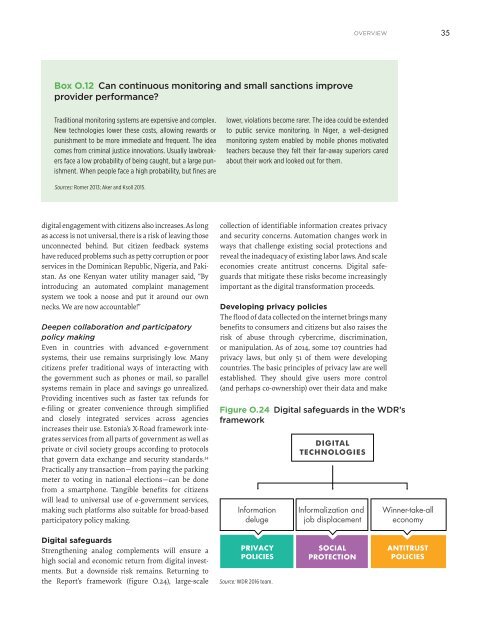Authorized Authorized
eERqs
eERqs
Create successful ePaper yourself
Turn your PDF publications into a flip-book with our unique Google optimized e-Paper software.
OVERVIEW<br />
35<br />
Box O.12 Can continuous monitoring and small sanctions improve<br />
provider performance?<br />
Traditional monitoring systems are expensive and complex.<br />
New technologies lower these costs, allowing rewards or<br />
punishment to be more immediate and frequent. The idea<br />
comes from criminal justice innovations. Usually lawbreakers<br />
face a low probability of being caught, but a large punishment.<br />
When people face a high probability, but fines are<br />
lower, violations become rarer. The idea could be extended<br />
to public service monitoring. In Niger, a well-designed<br />
monitoring system enabled by mobile phones motivated<br />
teachers because they felt their far-away superiors cared<br />
about their work and looked out for them.<br />
Sources: Romer 2013; Aker and Ksoll 2015.<br />
digital engagement with citizens also increases. As long<br />
as access is not universal, there is a risk of leaving those<br />
unconnected behind. But citizen feedback systems<br />
have reduced problems such as petty corruption or poor<br />
services in the Dominican Republic, Nigeria, and Pakistan.<br />
As one Kenyan water utility manager said, “By<br />
introducing an automated complaint management<br />
system we took a noose and put it around our own<br />
necks. We are now accountable!”<br />
Deepen collaboration and participatory<br />
policy making<br />
Even in countries with advanced e-government<br />
systems, their use remains surprisingly low. Many<br />
citizens prefer traditional ways of interacting with<br />
the government such as phones or mail, so parallel<br />
systems remain in place and savings go unrealized.<br />
Providing incentives such as faster tax refunds for<br />
e-filing or greater convenience through simplified<br />
and closely integrated services across agencies<br />
increases their use. Estonia’s X-Road framework integrates<br />
services from all parts of government as well as<br />
private or civil society groups according to protocols<br />
that govern data exchange and security standards. 34<br />
Practically any transaction—from paying the parking<br />
meter to voting in national elections—can be done<br />
from a smartphone. Tangible benefits for citizens<br />
will lead to universal use of e-government services,<br />
making such platforms also suitable for broad-based<br />
participatory policy making.<br />
collection of identifiable information creates privacy<br />
and security concerns. Automation changes work in<br />
ways that challenge existing social protections and<br />
reveal the inadequacy of existing labor laws. And scale<br />
economies create antitrust concerns. Digital safeguards<br />
that mitigate these risks become increasingly<br />
important as the digital transformation proceeds.<br />
Developing privacy policies<br />
The flood of data collected on the internet brings many<br />
benefits to consumers and citizens but also raises the<br />
risk of abuse through cybercrime, discrimination,<br />
or manipulation. As of 2014, some 107 countries had<br />
privacy laws, but only 51 of them were developing<br />
countries. The basic principles of privacy law are well<br />
established. They should give users more control<br />
(and perhaps co-ownership) over their data and make<br />
Figure O.24 Digital safeguards in the WDR’s<br />
framework<br />
Information<br />
deluge<br />
DIGITAL<br />
TECHNOLOGIES<br />
Informalization and<br />
job displacement<br />
Winner-take-all<br />
economy<br />
Digital safeguards<br />
Strengthening analog complements will ensure a<br />
high social and economic return from digital investments.<br />
But a downside risk remains. Returning to<br />
the Report’s framework (figure O.24), large-scale<br />
PRIVACY<br />
POLICIES<br />
Source: WDR 2016 team.<br />
SOCIAL<br />
PROTECTION<br />
ANTITRUST<br />
POLICIES


